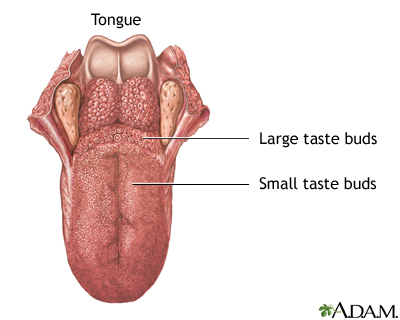Health Library
Geographic tongue
Patches on the tongue; Tongue - patchy; Benign migratory glossitis; Glossitis - benign migratory
Geographic tongue is characterized by irregular patches on the surface of the tongue. This gives it a map-like appearance.
Images

I Would Like to Learn About:
Causes
The exact cause of geographic tongue is unknown. It may be due to irritation from hot or spicy foods, or alcohol. The condition appears to be less common in smokers.
The change in pattern on the surface of the tongue occurs when there is a loss of the tiny, finger-like projections, called papillae, on the tongue. These areas look flat as a result. The appearance of the tongue may change very quickly. The flat-looking areas may remain for more than a month.
Symptoms
Symptoms include:
- Map-like appearance to the surface of the tongue
- Patches that move from day to day
- Smooth, red patches and sores (lesions) on the tongue
- Soreness and burning pain (in some cases)
Exams and Tests
Your health care provider will diagnose this condition by looking at your tongue. Most of the time, tests are not needed.
Treatment
No treatment is needed. Antihistamine gel or steroid- or tacrolimus-containing mouth rinses may help ease discomfort.
Outlook (Prognosis)
Geographic tongue is a harmless condition. It may be uncomfortable and last for a long time.
When to Contact a Medical Professional
Contact your provider if the symptoms last longer than 10 days. Seek medical help right away if:
- You have breathing problems.
- Your tongue is severely swollen.
- You have problems speaking, chewing, or swallowing.
Prevention
Avoid irritating your tongue with hot or spicy food or alcohol if you are prone to this condition.
Related Information
AllergiesReferences
Daniels TE, Jordan RC. Diseases of the mouth and salivary glands. In: Goldman L, Schafer AI, eds. Goldman-Cecil Medicine. 26th ed. Philadelphia, PA: Elsevier; 2020:chap 397.
James WD, Elston DM, Treat JR, Rosenbach MA, Neuhaus IM. Disorders of the mucous membranes. In: James WD, Elston DM, Treat JR, Rosenbach MA, Neuhaus IM, eds. Andrews' Diseases of the Skin: Clinical Dermatology. 13th ed. Philadelphia, PA: Elsevier; 2020:chap 34.
Pham KL, Mirowski GW. Oral diseases and oral manifestations of gastrointestinal and liver disease. In: Feldman M, Friedman LS, Brandt LJ, eds. Sleisenger and Fordtran's Gastrointestinal and Liver Disease. 11th ed. Philadelphia, PA: Elsevier; 2021:chap 24.
BACK TO TOPReview Date: 3/1/2023
Reviewed By: Josef Shargorodsky, MD, MPH, Johns Hopkins University School of Medicine, Baltimore, MD. Also reviewed by David C. Dugdale, MD, Medical Director, Brenda Conaway, Editorial Director, and the A.D.A.M. Editorial team.
 | A.D.A.M., Inc. is accredited by URAC, for Health Content Provider (www.urac.org). URAC's accreditation program is an independent audit to verify that A.D.A.M. follows rigorous standards of quality and accountability. A.D.A.M. is among the first to achieve this important distinction for online health information and services. Learn more about A.D.A.M.'s editorial policy, editorial process and privacy policy. A.D.A.M. is also a founding member of Hi-Ethics. This site complies with the HONcode standard for trustworthy health information: verify here. |
The information provided herein should not be used during any medical emergency or for the diagnosis or treatment of any medical condition. A licensed medical professional should be consulted for diagnosis and treatment of any and all medical conditions. Links to other sites are provided for information only -- they do not constitute endorsements of those other sites. No warranty of any kind, either expressed or implied, is made as to the accuracy, reliability, timeliness, or correctness of any translations made by a third-party service of the information provided herein into any other language. © 1997- 2025 A.D.A.M., a business unit of Ebix, Inc. Any duplication or distribution of the information contained herein is strictly prohibited.
